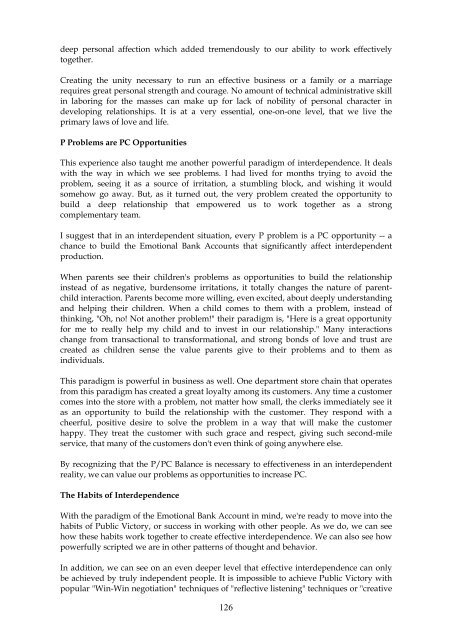Covey - The 7 habits of highly effective people
You also want an ePaper? Increase the reach of your titles
YUMPU automatically turns print PDFs into web optimized ePapers that Google loves.
deep personal affection which added tremendously to our ability to work <strong>effective</strong>ly<br />
together.<br />
Creating the unity necessary to run an <strong>effective</strong> business or a family or a marriage<br />
requires great personal strength and courage. No amount <strong>of</strong> technical administrative skill<br />
in laboring for the masses can make up for lack <strong>of</strong> nobility <strong>of</strong> personal character in<br />
developing relationships. It is at a very essential, one-on-one level, that we live the<br />
primary laws <strong>of</strong> love and life.<br />
P Problems are PC Opportunities<br />
This experience also taught me another powerful paradigm <strong>of</strong> interdependence. It deals<br />
with the way in which we see problems. I had lived for months trying to avoid the<br />
problem, seeing it as a source <strong>of</strong> irritation, a stumbling block, and wishing it would<br />
somehow go away. But, as it turned out, the very problem created the opportunity to<br />
build a deep relationship that empowered us to work together as a strong<br />
complementary team.<br />
I suggest that in an interdependent situation, every P problem is a PC opportunity -- a<br />
chance to build the Emotional Bank Accounts that significantly affect interdependent<br />
production.<br />
When parents see their children's problems as opportunities to build the relationship<br />
instead <strong>of</strong> as negative, burdensome irritations, it totally changes the nature <strong>of</strong> parentchild<br />
interaction. Parents become more willing, even excited, about deeply understanding<br />
and helping their children. When a child comes to them with a problem, instead <strong>of</strong><br />
thinking, "Oh, no! Not another problem!" their paradigm is, "Here is a great opportunity<br />
for me to really help my child and to invest in our relationship." Many interactions<br />
change from transactional to transformational, and strong bonds <strong>of</strong> love and trust are<br />
created as children sense the value parents give to their problems and to them as<br />
individuals.<br />
This paradigm is powerful in business as well. One department store chain that operates<br />
from this paradigm has created a great loyalty among its customers. Any time a customer<br />
comes into the store with a problem, not matter how small, the clerks immediately see it<br />
as an opportunity to build the relationship with the customer. <strong>The</strong>y respond with a<br />
cheerful, positive desire to solve the problem in a way that will make the customer<br />
happy. <strong>The</strong>y treat the customer with such grace and respect, giving such second-mile<br />
service, that many <strong>of</strong> the customers don't even think <strong>of</strong> going anywhere else.<br />
By recognizing that the P/PC Balance is necessary to <strong>effective</strong>ness in an interdependent<br />
reality, we can value our problems as opportunities to increase PC.<br />
<strong>The</strong> Habits <strong>of</strong> Interdependence<br />
With the paradigm <strong>of</strong> the Emotional Bank Account in mind, we're ready to move into the<br />
<strong>habits</strong> <strong>of</strong> Public Victory, or success in working with other <strong>people</strong>. As we do, we can see<br />
how these <strong>habits</strong> work together to create <strong>effective</strong> interdependence. We can also see how<br />
powerfully scripted we are in other patterns <strong>of</strong> thought and behavior.<br />
In addition, we can see on an even deeper level that <strong>effective</strong> interdependence can only<br />
be achieved by truly independent <strong>people</strong>. It is impossible to achieve Public Victory with<br />
popular "Win-Win negotiation" techniques <strong>of</strong> "reflective listening" techniques or "creative<br />
126


